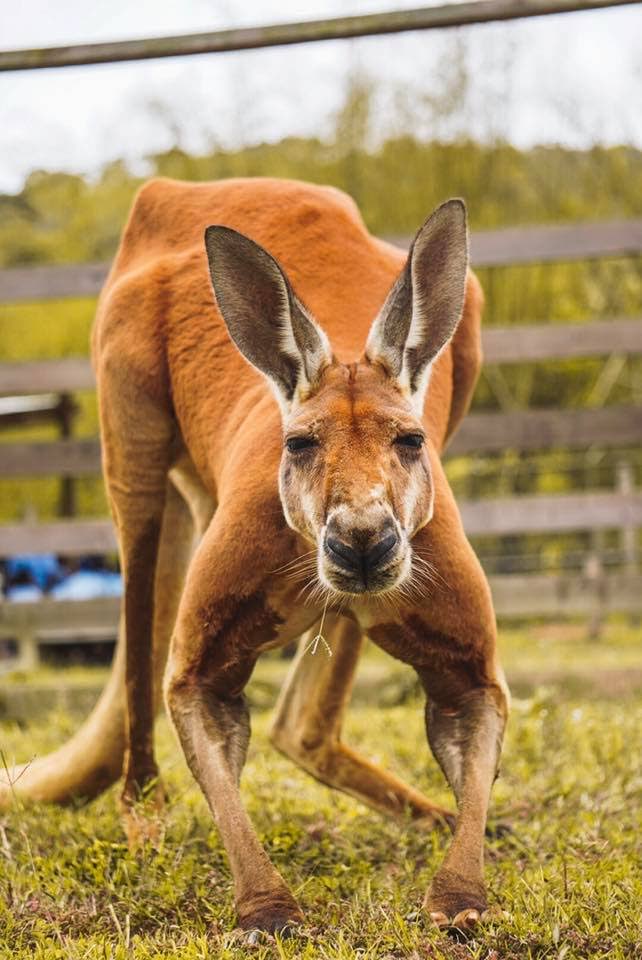Emperor Valley Zoo: Kangaroo Jack died since May

SIX MONTHS after Jack, a red kangaroo at the Emperor Valley Zoo, was last seen, the Zoological Society has revealed he died on May 3.
The Zoological Society sent a statement on September 22 – the same day Newsday published an article raising questions about Jack’s whereabouts, noting the zoo’s unwillingness to share information.
Newsday had been trying to get information about Jack’s welfare, visiting the zoo in April after images of the emaciated-looking kangaroo circulated on social media.
The zoo’s latest statement, signed by zoo consultant John Seyjagat, reported the cause of death established by the UWI School of Veterinary Medicine.
“(The cause) of death as diagnosed (was): cardiomyopathy – diffuse; pulmonary congestion – acute mild to moderate and diffuse with focal granuloma; enteritis – segmental, acute mild; hepatic congestion – diffuse and moderate with capsular fibrosis, moderate with capsular fibrosis, diffuse mild and chronic.”
Cardiomyopathy refers to any disorder that affects the heart muscle.
The autopsy found faeces present in the rectum, while the remainder of the intestinal tract was empty.
“The cardiomyopathy is likely the main contributor to the death of this animal, leading to pulmonary and hepatic congestion with fibrosis,” Seyjagat said.
Seyjagat opened his statement by apologising on behalf of the zoo and the Zoological Society “for any missed calls and or appointments to speak with a ZSTT representative on the kangaroo issue.
“We appreciate your interest in the zoo, its animal collection and our animal care and welfare program.”
Jack was transferred from the Safari Eco Park petting zoo in Chaguaramas to the Emperor Valley Zoo in January 2023.
Images of a malnourished Jack began circulating on social media earlier this year, sparking widespread concern and outrage directed at the zoo.
Seyjagat responded, “When the animal came to the Emperor Valley Zoo, it was already in poor condition, already old and losing its muscle mass.”
The Safari Eco Park disagreed, saying the kangaroo was well-fed and healthy when it was moved to the zoo.
It also said the kangaroo was about nine at the time, significantly younger than the 15-20 years estimated by the zoo.
“The Emperor Valley Zoo at that time addressed the public’s concerns on social and print media,” Seyjagat noted.
“Prior to the social media releases and related threads, the Zoological Society has had ongoing health assessments of Jack and several follow-up evaluations on his health and welfare by leading experts inhouse (EVZ veterinarian) and local (chief veterinary inspector team) and foreign welfare veterinary experts.”
Seyjagat said that on March 5, Jack’s evaluation showed he was “active, bright, alert and responsive with a good appetite and stool.
“There is no evidence of disease or welfare concerns, and his weight was expected to remain at a BCS of 3.5/9 due to his physiological state and age.
“On March 8, 2024, a remote veterinary visual examination was conducted by foreign welfare experts (and the) EVZ veterinarian and staff.”
Seyjagat said the visual examination began with Jack on film, walking and moving undisturbed in his enclosure.
“His gait was neurologically normal, but he did not hop like a typical kangaroo.
“Instead, his gait consisted of first shifting his weight to his arms...placed on the ground briefly, then moving his pelvic limbs forward. In this way, he would effectively move forward without hopping.”
Jack, he said, had another physical examination on April 15 and 16, done by the zoo’s veterinarian and staff in consultation with an animal welfare expert from the University of Florida School of Veterinary Medicine and the Zoological Society of America.
“The evaluation concluded that although no specific, clinically detectable disease was identified in either examination.
“Vets’ remarks were that ranked differential diagnosis, based on common geriatric kangaroo diseases, and their clinical experience included: occult neoplastic disease; subclinical cardiac disease; a walled-off bacterial or fungal infection; dental disease; and renal disease.
“Overall assessment is that Jack is a geriatric kangaroo, with several findings consistent with his old age.
“As with most geriatric animals, he has lost some weight but is not cachectic nor malnourished (and while) I cannot conclude that he is a truly ‘healthy’ kangaroo, I can say that failed (sic) to find any treatable problem that is currently impacting his welfare.”
He said the zoo and the society take “animal welfare seriously and provide exemplary husbandry and care of its animals.
“Jack lived a full life and passed away with dignity at age 12-14 years.”

Comments
"Emperor Valley Zoo: Kangaroo Jack died since May"